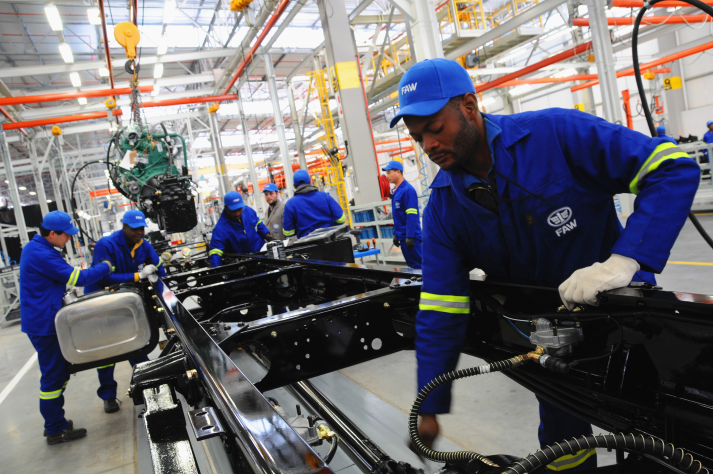|
||||||||||
| Home Nation World Business Opinion Lifestyle ChinAfrica Multimedia Columnists Documents Special Reports |
|
||||||||||
| Home Nation World Business Opinion Lifestyle ChinAfrica Multimedia Columnists Documents Special Reports |
| Opinion |
| Shaping Growth Fortunes |
| South Africa-China 20 years of economic relations - what's transpired and what's next? |
| By Hannah Edinger ·2018-01-15 |

A lot of changes have transpired in the global economy, in China, as well as in South Africa since the bilateral relations between South Africa, Africa's most industrialized country, and China, Asia's powerhouse, were established on January 1, 1998. As the global economy finds its feet 10 years after the global financial crisis, China is now in its "new normal" featuring medium and low economic growth and South Africa is preoccupied with various political and economic challenges in a subdued African growth environment. What then has transpired in this commercial corridor over the past two decades? What impact have these relations had and what opportunities have been found and missed?
Trade relations
Undoubtedly, the largest impact has been seen in the trade relations of the two countries. South Africa's merchandise trade with China has grown rapidly and increased 11-fold between 1998 and 2016 according to the United Nations Conference on Trade and Development.
Both South Africa's exports to and imports from China gained significant momentum from the mid-2000 aligned to the rapid rise of commodity prices. Over the past nearly two decades, South Africa's trade with China increased faster than its trade with the rest of the world, making China a more prominent player in both export and import figures.

Between 1998 and 2016, South Africa's exports to China increased more than 9-fold, elevating China from a 2-percent to a 7.8-percent share on average in South Africa's exports (in 2011, the figure was 11.6 percent). Similarly, South African imports from China increased 11.6-fold and elevated China's share in South Africa's imports from 4 percent to a whopping 18.1 percent.
From a merchandise trade perspective, while increasing its trade with China in volume, South Africa arguably has missed opportunities on more than one occasion to leverage this trade partnership to its full potential. For example, during the height of the China-driven commodity supercycle, South Africa was unable to increase commodity exports to meet China's demand given supply-side constraints.
This is also notable in terms of diversifying the country's export profile aligned to its own comparative advantages. This includes, for example, not having leveraged the diplomatic relationship to its full potential for growing South African market access for key produce, including food, beverage and other agricultural products.
Cost competitive production bases
Coupled to China's economic restructuring and rebalancing, rising input costs such as wages have seen export-orientated manufacturing firms in China move offshore in the search for more cost competitive production bases. While manufacturing added value as a share of GDP in South Africa has declined from over 18 percent in 1998 to about 13 percent currently, it was not South Africa but countries like Ethiopia that have actively attracted Chinese offshore export-orientated investment into value adding sectors such as clothing, shoes and light vehicles to boost their manufacturing capacity. Given South Africa's triple challenges of unemployment, poverty and inequality and the known positive spillovers of manufacturing on overcoming these challenges, this is arguably a missed opportunity.
This also speaks to investment, with an arguably missed opportunity of South Africa's relations with China being that of not having attracted more Chinese job-creating investment into the country. South African companies moved faster into China than Chinese companies into South Africa. South African foreign investment stock in China was reported to exceed that of China in South Africa until 2007 - largely driven by firms such as Naspers, SABMiller, Richemont, Sasol, Exxaro, and others in the mining, financial services and machinery sectors. The tables turned in 2007 with the hallmark deal of the Industrial and Commercial Bank of China's (ICBC) 20-percent purchase of Standard Bank, worth $5.5 billion.
Chinese companies such as Huawei, Hisense and FAW are manufacturing in South Africa and are quickly becoming household names. Chinese companies across sectors including financial services, automotive, cement, and property development have set foot in South Africa, and often made the Southern African country their regional base for Africa-wide operations. Funding organization China-Africa Development Fund also established its first of multiple African offices in South Africa a decade ago to support outbound investments of Chinese firms into Africa in key prioritized sectors such as manufacturing, infrastructure, agriculture and energy.
Estimates by the Chinese Embassy in South Africa indicate that more than 140 Chinese medium to large companies are operating in South Africa, employing over 30,000 South Africans.
Challenges
Yet, these investments have not been without challenges. For one, Chinese companies are fast learning the consumer preferences of often brand-orientated South Africans. The experience of Chinese auto players is a case in point. Also, the challenges of high barriers to enter some sectors, localization and transformation requirements, the lack of an enabling environment including infrastructure challenges, crime, and political and economic uncertainties are likely to test the often referenced long-term view of Chinese firms in South Africa.
South Africa, too, has lagged on the establishment of special economic zones (SEZs) when other African countries were courting China to invest and co-create these a decade ago. This and the lack of success of South Africa's industrial development zones - the precursors of its now being established SEZs - opened the country up to competition from various economic clusters in East and West Africa courting Chinese investment. Beyond being the most developed economy in Africa, South Africa has been unable to elevate its competitive advantages vis-à-vis other emerging economies in the region.
Yet, South Africa's friendly relations with China have helped to shape the focus on Africa's development in key forums, including the triennial Forum on China-Africa Cooperation conference, the most recent of which was held in Johannesburg in December 2015, the BRICS summits, and the G20 summits. Africa has been refocused as a commercial opportunity rather than a development burden through such forums.
Greater awareness of Chinese language and business culture has seen increased interest in the world's second largest economy, as a place of study, commerce, work and even leisure for South Africans. Similarly, there has been increased interest from China in Africa, especially South Africa as a tourist destination. As the largest source market for outbound tourism in the world, the Asian country is the top source of tourism growth for South Africa. Although stifled by some now eliminated visa restrictions, annual growth has been double digit (38 percent for 2016), generating much-needed foreign exchange receipts for the Rainbow Nation.
The elephant in the room remains how South Africa can leverage China better for shaping its own growth fortunes given China's fast-emerging middle class, purchasing power and rapidly growing consumer market. South Africa needs to move away from an overreliance on a resource-driven comparative export advantage and reboot its own, currently misfiring business model, aligning it, partially at least, to China's structural adjustments. In the coming decade, if South African businesses do not refocus their value proposition, they will not reap the most benefits from South Africa's strategic relationship with China.
(The author is associate director at Deloitte)
The opinions expressed in this article are purely those of the author and do not necessarily reflect the views of Deloitte.
|
||||||
| About Us | Contact Us | Advertise with Us | Subscribe |
| Copyright Beijing Review All rights reserved 京ICP备08005356号-5 京公网安备110102005860号 |